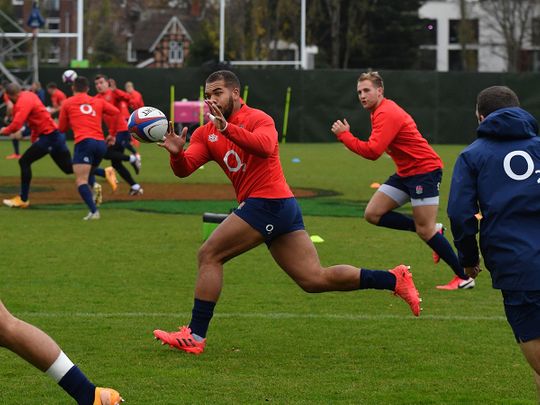London: England coach Eddie Jones expects a heavyweight contest in more ways than one when his Six Nations champions face Ireland in the second round of the Autumn Nations Cup at Twickenham on Saturday.
Both teams go into what could be a decisive Pool A clash following resounding home wins, with England thrashing second-tier Georgia 40-0 and Ireland overwhelming Wales 32-9.
England, however, have won their last three matches against Ireland. But an Ireland team coached by Andy Farrell, the father of England captain Owen, has a new look about it.
Ross Byrne replaces injured Ireland captain Johnny Sexton at fly-half, with the new No. 10 partnered at half-back by his Leinster team-mate Jamison Gibson-Park who keeps the vastly-experienced Conor Murray on the bench.
An Ireland back-row of Caelan Doris, Peter O’Mahony and CJ Stander prompted England coach Jones to revert to the loose forward trio he deployed in last year’s World Cup final loss to South Africa, with No. 8 Billy Vunipola lining up alongside flankers Sam Underhill and Tom Curry.
“Well, it’s a different Irish side so we’ll need to play differently,” said Jones. “They’ve picked that heavy back row and normally they pick more of a ‘fetcher’ in there.”
Ireland’s side also features James Lowe, the New Zealand-born wing who scored a try on Test debut against Wales last week.
“I’ve got a vivid memory of James Lowe, playing for the New Zealand Maori against Japan in 2015 at Kobe Stadium,” recalled Jones. “He scored a double chip-and-chase try against us, from his own goal-line, so I know what a talented player he is.”
‘United Nations’
Lowe is one of several overseas-born players in Ireland’s starting XV, with Gibson-Park and centre Bundee Aki also hailing from New Zealand while Stander and lock Quinn Roux were both born in South Africa.
But Jones had no qualms with players qualifying under a controversial three-year residency rule even though World Rugby are in the process of extending the period to five years.
“I heard someone calling them (Ireland) the United Nations, mate, so I had a little chuckle,” he said.
“I can understand how Irish people would be upset about Irish-born players missing out. But they are the laws and regulations of international rugby; they are just sticking by the regulations.”
In Pool B, France are away to Scotland on Sunday as they seek revenge for their only loss under coach Fabien Galthie – a 28-17 Six Nations defeat at Murrayfield in March where prop Mohamed Haouas was sent off as Les Bleus were denied a Grand Slam.
They will be without injured fly-half Romain Ntamack, whose half-back partnership with Antoine Dupont has sparked much of a resurgent France’s exciting attacking play. Scotland’s 28-17 win over Italy last time out was their fifth straight victory – a run wing Blair Kinghorn insists is “not a fluke”.
France’s opening pool match against Fiji was cancelled because of a coronavirus outbreak in the Pacific islanders’ camp. And a tournament created following the fall-out from the pandemic, might not see Fiji play at all after 29 fresh cases put paid to this week’s match with Italy and placed a huge question mark over their concluding pool game against Scotland.
Elsewhere, a Wales team on a run of six straight defeats face Georgia. Wales’ losing streak has not stopped coach Wayne Pivac from making 13 changes to his starting XV as he looks to build squad depth ahead of the 2023 World Cup.
They include a debut for Cardiff flanker James Botham, the grandson of England cricket great Ian Botham. Pivac, a native New Zealander, knows all about the family history. “I have seen his grandad play,” Pivac said. “He destroyed New Zealand many times.”
But it’s the ability of the 22-year-old James Botham, not his ancestry, that has impressed Pivac. “It’s his size, his athleticism, his skills, and for a young guy coming into a new environment his level of communication and confidence.”

